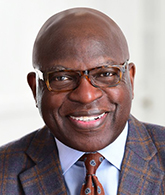With Virgil Fludd
In the last few months, I’ve talked about fostering a sense of belonging, and about the importance that we as leaders have to demonstrate to ensure people feel like they belong. It’s not easy work, though.
I think some of the challenge is when you’re the “in-group,” you don’t feel compelled to accommodate others. They should come in and fit us. I don’t have to do or change anything. And that’s part of the challenge – you don’t have to…but you should.
That kind of thing is hard because it makes people feel uncomfortable that now they’ve got to do something that breaks the normalcy they’ve been accustomed to. And there’s a measure of defensiveness about there being something wrong with the way we’re used to doing things – that there’s something that needs to change.
This thing works fine for me. It worked fine for my daddy and his daddy before. Why should I have to change?
I served seven terms in the Georgia General Assembly, pushing for progressive changes – not monumental, but let’s make things better kind of change across a number of areas like education, technology and access to health care. One comment I heard multiple times was Why do you want to change it? We’re fine, and by the way, you moved here, so you must have thought it was okay too so…we’re not changing.
Few people are comfortable with discomfort. Those few who are comfortable with discomfort need to be a bit more activated and uplifted so they can help people who aren’t comfortable with being uncomfortable get to that point.
Because change is uncomfortable – even when it’s good for you. Take my diet, for example. I don’t want to eat more vegetables, but I do. I don’t want to eat brown rice instead of white rice (I’m from Charleston), but it’s better for me, and I’ll live longer. I’ll probably be healthier and happier, but it’s change.
There has been a lot of talk in the last few years about the importance of change and a desire to do things differently, but while we have seen some positive change, the work isn’t done yet. There’s still so much more that needs to be accomplished.
It would be like me eating a bowl of brown rice and patting myself on the back to say ‘job well done!’ I can’t eat one bowl of brown rice and call myself healthy. Having a salad for lunch one day isn’t the finish line (as much as I wish it were).

I attended a seminar on race relations a few years ago, where the speaker made the point that his blackness is always on his mind. How people perceive him, what he wears, how he speaks, how he comes across – is always on his mind. And that felt familiar – I think most black people think about their blackness every single day. There were white business leaders in the class that day who said they never thought about their whiteness – ever. So, if it’s not a load you’ve had to bear every day, it’s going to feel heavier, and it will get tiring.
I did that last week or last month, or, oh, I hired these people or promoted these other folks. And I still got more work to do? When does this end?
Well, it doesn’t end. It’s something that needs to be carried every day. And the idea that you have to carry it every day is somehow exhausting, but the reality is it’s exhausting for everybody. For underrepresented groups, it’s exhausting, but there are no other alternatives.
I think what it comes down to is taking a more thoughtful approach to everything we do. Yes, it’s a daily challenge, but the hard and tiring and uncomfortable things can be good for us.
Even still, I am hopeful about the future. I have to be. I listen to my two adult children talk about race, ethnicity, gender identity and religion in a much more aspirational tone. They are also more demanding of the institutions that they engage with – government, employers, service providers and corporate brands. They want to hold organizations accountable and are more accepting of people who are different from them. They work on making others feel like they belong, and I learn from them every day.
I hope to hear back from you on your thoughts on these ideas, and I appreciate the opportunity to talk with you about the topic – it’s by conversing about things that we all become more comfortable.
Read last month’s edition of Thoughts on Belonging With Virgil Fludd here.
